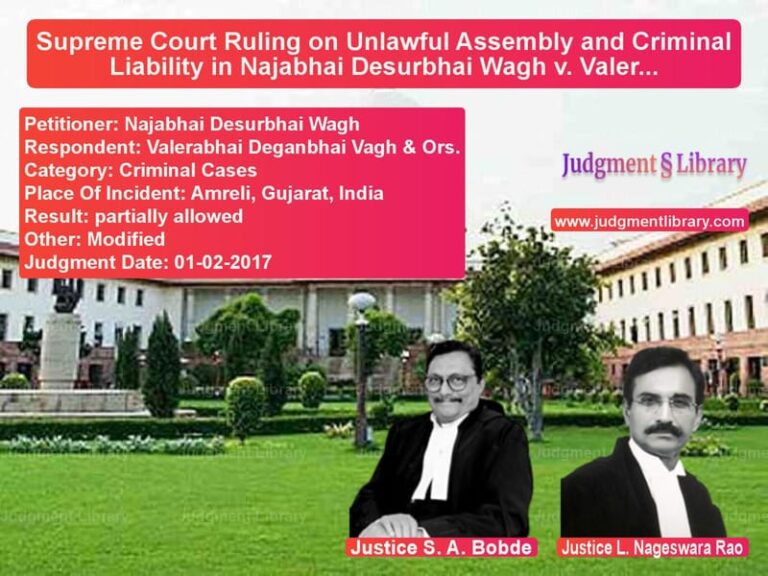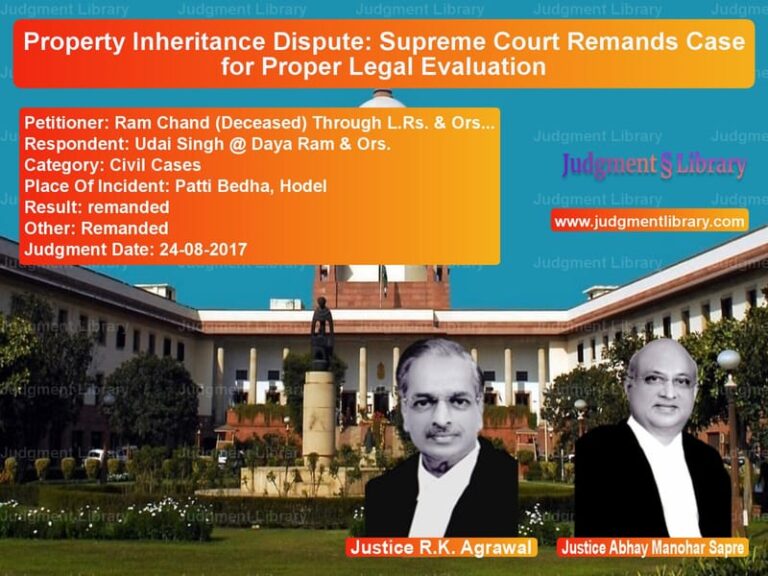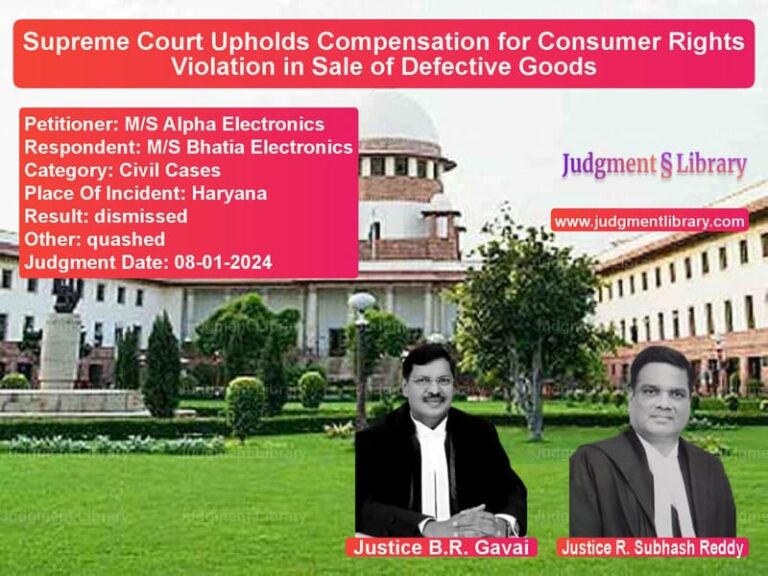Role of Victim’s Counsel in Criminal Trials: Supreme Court Clarifies Limits
The Supreme Court of India, in the case of Rekha Murarka v. The State of West Bengal & Anr., examined the extent to which a victim’s counsel can participate in a criminal trial, particularly in a Sessions Court trial. This case provides clarity on whether a victim’s lawyer can actively conduct the prosecution by examining witnesses, cross-examining defense witnesses, and making oral arguments.
Background of the Case
The appellant, Rekha Murarka, is the widow of the deceased, Gyan Prakash Murarka, who was allegedly murdered by the respondent. The trial began in the Sessions Court after charges were framed under Sections 302 and 326 of the Indian Penal Code (IPC). As the trial progressed, the appellant sought the court’s permission to allow her lawyer to participate actively in the prosecution, beyond merely assisting the Public Prosecutor.
Specifically, she filed an application under Section 301 read with the proviso to Section 24(8) of the Code of Criminal Procedure (CrPC), requesting the following permissions:
- To present oral arguments on questions of law and fact.
- To object to any irrelevant questions posed to prosecution witnesses.
- To examine prosecution witnesses after the Public Prosecutor.
- To cross-examine defense witnesses.
The Sessions Court rejected her request, ruling that the prosecution is under the control of the Public Prosecutor and that the role of a victim’s counsel is limited to assisting the prosecution.
The appellant then approached the Calcutta High Court, which upheld the Sessions Court’s order. Dissatisfied with the decision, she appealed to the Supreme Court.
Arguments by the Petitioner
The petitioner’s senior counsel argued:
- The CrPC amendments in 2009 introduced a victim-centric approach, allowing victims greater participation in trials.
- Section 24(8) of the CrPC, read with its proviso, allows a victim to engage a private counsel, and this should extend beyond merely submitting written arguments.
- Victims have often been neglected in criminal trials, and greater involvement of their counsel would ensure fairer proceedings.
- Courts should allow the victim’s counsel to object to improper questioning and directly cross-examine defense witnesses if the Public Prosecutor overlooks key aspects of the case.
Arguments by the Respondents
The State of West Bengal, representing the prosecution, countered:
- The role of a Public Prosecutor is to conduct the prosecution independently, without undue influence from private parties.
- If victims’ lawyers are allowed to conduct trials directly, it could compromise the fairness of trials and lead to vindictive prosecution.
- The phrase “assist the prosecution” in Section 24(8) indicates a secondary role for the victim’s lawyer, not a leading one.
- The presence of an independent Public Prosecutor ensures that prosecution remains fair and does not become an instrument of private revenge.
Key Observations by the Supreme Court
1. The Role of a Public Prosecutor
The Supreme Court reiterated that the Public Prosecutor is the primary authority responsible for conducting the prosecution in a Sessions trial. The Court observed:
“A Public Prosecutor is not just a representative of the aggrieved person but also of the State at large. His primary duty is to assist the Court in arriving at the truth by putting forth all the relevant material.”
The Court noted that the Public Prosecutor is an officer of the Court and has an obligation to act fairly, ensuring both the victim’s and the accused’s rights are protected.
2. Limited Scope for Victim’s Counsel
On the role of a victim’s counsel, the Supreme Court held:
“The victim’s counsel is only intended to have a secondary role, and the use of the term ‘assist’ in Section 24(8) indicates that he cannot independently conduct the prosecution.”
The Court stated that allowing the victim’s lawyer to cross-examine witnesses or make oral arguments would dilute the statutory role of the Public Prosecutor and could lead to parallel prosecutions.
3. Concerns Over Trial Fairness
The Court expressed concerns that if victims’ lawyers were given free rein in prosecution, it could affect trial fairness:
- A victim’s counsel might pursue personal vendettas rather than act in the interests of justice.
- Allowing multiple legal representatives in a prosecution could lead to inconsistent strategies and weaken the case.
- A victim’s lawyer might insist on calling unnecessary witnesses or asking irrelevant questions, disrupting trial proceedings.
4. When Can the Victim’s Lawyer Intervene?
While limiting the victim’s counsel’s role, the Court acknowledged that there might be instances where the Public Prosecutor overlooks certain aspects. In such cases:
- The victim’s lawyer can suggest questions or raise objections through the Public Prosecutor.
- If the Public Prosecutor fails to address key issues, the victim’s lawyer can bring them to the attention of the trial judge.
- The judge can, at their discretion, invoke Section 311 of the CrPC (power to summon witnesses) or Section 165 of the Indian Evidence Act (power to put questions) to ensure justice.
Conclusion
The Supreme Court dismissed the appellant’s plea and upheld the Calcutta High Court’s ruling. The Court held that while a victim’s lawyer can assist the prosecution, they cannot replace or act independently of the Public Prosecutor. The ruling reinforces the principle that prosecution in criminal trials should be conducted in an impartial and structured manner to ensure fairness for both victims and accused persons.
By clarifying the limited role of a victim’s counsel, the Supreme Court has struck a balance between ensuring victims’ rights and maintaining the integrity of criminal proceedings. This decision serves as a guideline for future cases where victims seek an active role in prosecutions.
Petitioner Name: Rekha Murarka.Respondent Name: The State of West Bengal & Anr..Judgment By: Justice Mohan M. Shantanagoudar, Justice Deepak Gupta.Place Of Incident: West Bengal, India.Judgment Date: 20-11-2019.
Don’t miss out on the full details! Download the complete judgment in PDF format below and gain valuable insights instantly!
Download Judgment: Rekha Murarka vs The State of West Be Supreme Court of India Judgment Dated 20-11-2019.pdf
Direct Downlaod Judgment: Direct downlaod this Judgment
See all petitions in Bail and Anticipatory Bail
See all petitions in Fraud and Forgery
See all petitions in Extortion and Blackmail
See all petitions in Attempt to Murder Cases
See all petitions in Custodial Deaths and Police Misconduct
See all petitions in Judgment by Mohan M. Shantanagoudar
See all petitions in Judgment by Deepak Gupta
See all petitions in dismissed
See all petitions in supreme court of India judgments November 2019
See all petitions in 2019 judgments
See all posts in Criminal Cases Category
See all allowed petitions in Criminal Cases Category
See all Dismissed petitions in Criminal Cases Category
See all partially allowed petitions in Criminal Cases Category







